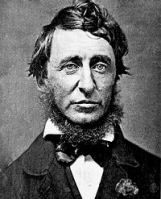| 亨利·大卫·梭罗 | |||||||
阅读亨利·戴维·梭罗 Henry David Thoreau在散文天地的作品!!! 阅读亨利·戴维·梭罗 Henry David Thoreau在百家争鸣的作品!!! | |||||||
1845 年 7 月 4 日 梭罗开始了一项为期两年的试验,他移居到离家乡康科德城(Concord)不远,优美的瓦尔登湖畔的次生林里,尝试过一种简单的隐居生活。他于1847年9月 6日离开瓦尔登湖,重新和住在康科德城的他的朋友兼导师拉尔夫·沃尔多·爱默生一家生活在一起。出版于1854年的散文集《瓦尔登湖》详细记载了他在瓦尔登湖畔两年又两个月的生涯。虽毕业于世界闻名的哈佛大学,但他没有选择经商发财或者从政成为明星,而是平静地选择了瓦尔登湖,选择了心灵的自由和闲适。他搭起木屋,开荒种地,写作看书,过着非常简朴、原始的生活。
Thoreau's books, articles, essays, journals, and poetry total over 20 volumes. Among his lasting contributions were his writings on natural history and philosophy, where he anticipated the methods and findings of ecology and environmental history, two sources of modern day environmentalism. His literary style interweaves close natural observation, personal experience, pointed rhetoric, symbolic meanings, and historical lore; while displaying a poetic sensibility, philosophical austerity, and "Yankee" love of practical detail. He was also deeply interested in the idea of survival in the face of hostile elements, historical change, and natural decay; at the same time imploring one to abandon waste and illusion in order to discover life's true essential needs.
He was a lifelong abolitionist, delivering lectures that attacked the Fugitive Slave Law while praising the writings of Wendell Phillips and defending abolitionist John Brown. Thoreau's philosophy of civil disobedience influenced the political thoughts and actions of such later figures as Leo Tolstoy, Mahatma Gandhi, and Martin Luther King, Jr.
Thoreau is sometimes cited as an individualist anarchist. Though Civil Disobedience calls for improving rather than abolishing government – "I ask for, not at once no government, but at once a better government" – the direction of this improvement aims at anarchism: "'That government is best which governs not at all;' and when men are prepared for it, that will be the kind of government which they will have."
